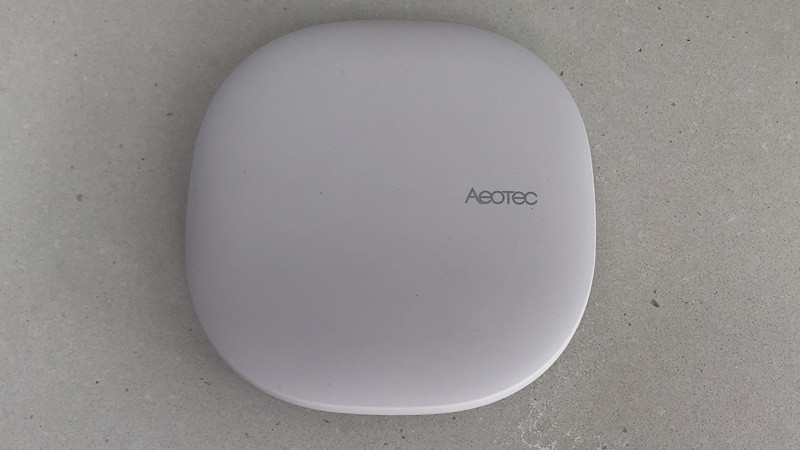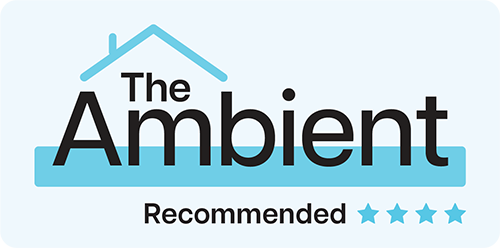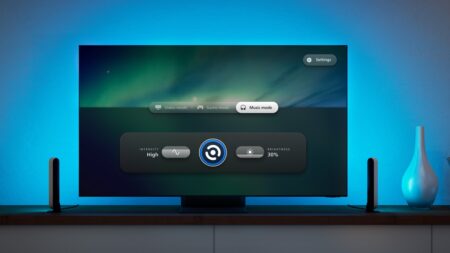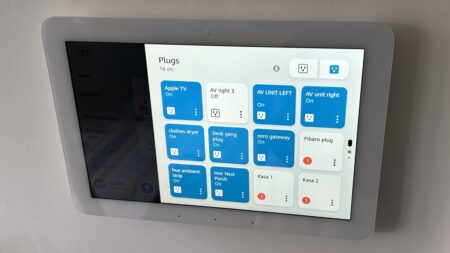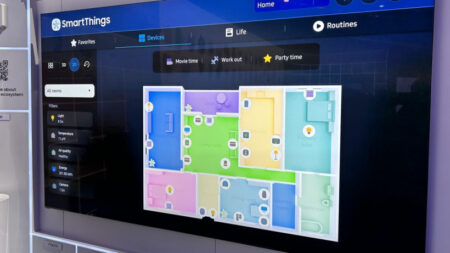The new hub that is basically the same as the old hub (no bad thing)
A simple transfer of name, the Aeotec Smart Home Hub gives you everything that the original SmartThings V3 gave you, namely a way of connecting Z-Wave and Zigbee devices. If you’ve got an old SmartThings V1 hub, then this is an essential upgrade, but V2 and V3 owners don’t have to move yet. For new SmartThings users, the Aeotec Smart Home Hub is great if you need to hook up Z-Wave and Zigbee devices, but you can use SmartThings without it if the devices you want to use connect via the cloud. Before you buy, then, check whether or not you’ll need this hub.
Pros
- Z-Wave and Zigbee support
- Integrates perfectly with SmartThings
- Ethernet and Wi-Fi connectivity
Cons
- Fiddly to migrate to this hub
- SmartThings has limited hardware support
Samsung’s SmartThings was at the centre of a massive rumor that the entire thing was about to be shut down. As it turned out, that was only partly true.
Samsung decided that it would continue to make the software but it didn’t want to make its own-brand hardware anymore, so production of the Hub has moved and we now have the Aeotec Smart Home Hub.
Effectively the Aeotec Smart Home Hub is the same product as the SmartThings V3 Hub, capable of working with Z-Wave and Zigbee devices, controlled via the SmartThings software.
- Top picks: Best smart home hubs
So, is it worth upgrading for those with an existing hub and what about if you’re new to the platform? I’ll answer all of that, here in our full Aeotec Smart Home Hub review.
Aeotec Smart Home Hub Design and Installation
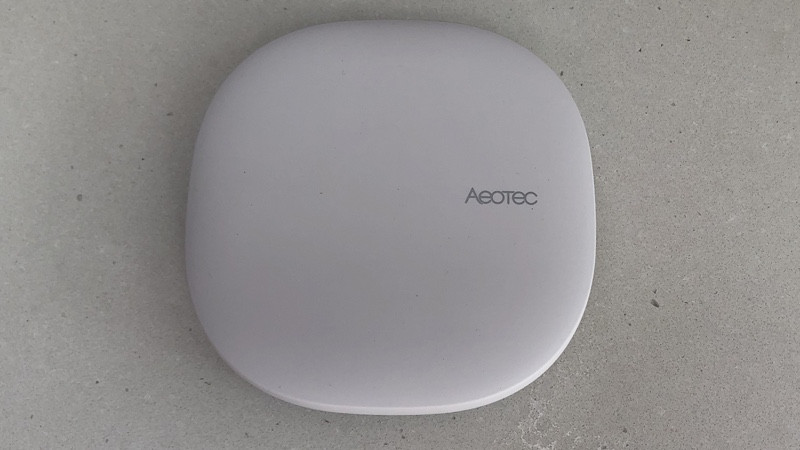
Line up the Aeotec Smart Home Hub with the Samsung SmartThings Hub V3 and you won’t spot any differences bar the branding.
That’s because both products are exactly the same, it’s just that Aeotec, not Samsung, is now manufacturing the hub.
Hidden inside the case are two very important modules: Z-Wave and Zigbee. Between the two, you’re basically covered for a large portion of standalone sensors, lights and other smart devices.
At the back of the Smart Home Hub is an Ethernet port, although you can connect via Wi-Fi. For reliability, I prefer to use Ethernet but Wi-Fi is a good backup if you don’t happen to have your router nearby for a physical cable.
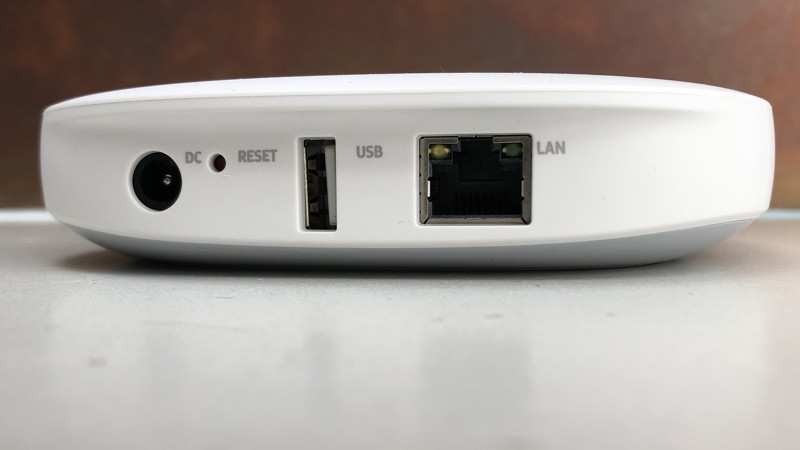
There’s no battery in this model and it’s only the SmartThings V2 hub that had this. Is that an issue? Well, only if you were going to use SmartThings as the basis of your home alarm system.
I personally wouldn’t bother as it’s too much hassle to set up, and a dedicated alarm, such as the Ring Alarm is far easier to use.
Without using it as an alarm, the Hub really doesn’t need battery backup: if the power goes down, then it stands to reason that everything it would control is also out of power.
Once powered one, you use the SmartThings app to add the Hub to your account. Here, you have to select the Hub as an Aeotec model, rather than Samsung, but the installation is otherwise the same as it was for the V3 Hub. A short setup wizard takes you through the installation process.
Aeotec Smart Home Hub Features
As with other smart home hubs, the Aeotec one doesn’t do much. That is, it acts as the connection point for Zigbee and Z-Wave devices, but it’s the SmartThings platform that brings the intelligence.
Technically, you don’t even need a hub to use SmartThings, as many devices are connected via cloud accounts.
For example, if you have a Yale Conexis L1 smart lock, you do need a hub, as this lock connects via the optional Z-Wave module; if you have the newer Yale Linus lock, you don’t need a hub, as this lock connects to SmartThings via the web.
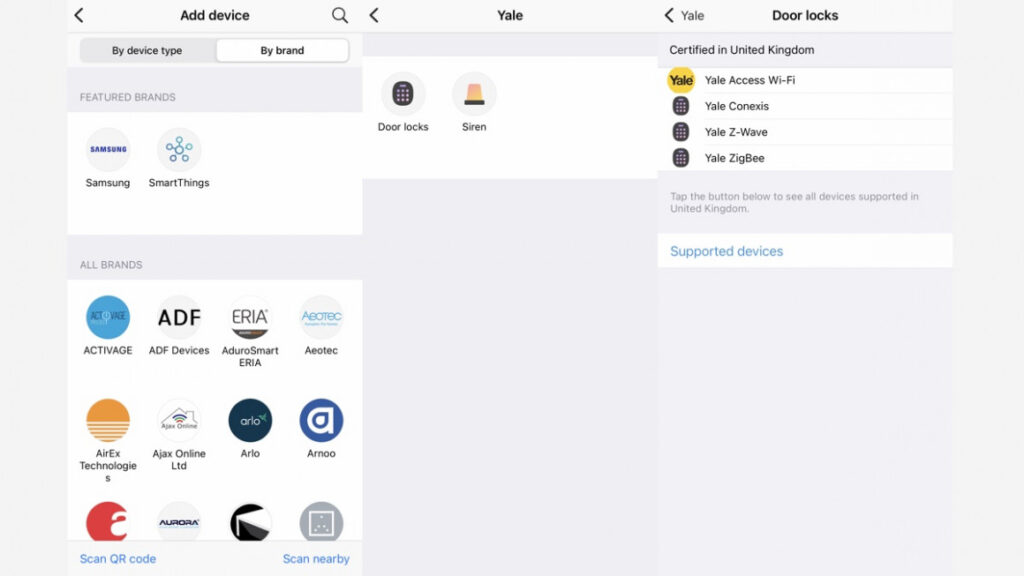
In fact, most of the big names that you see that have SmartThings compatibility connect via the cloud. This includes Nest (cameras, doorbells and thermostats), Ring (cameras and doorbells) and Arlo.
Everything appears in the app, where you can group devices into rooms and control each product as you’d expect: you can lock and unlock smart locks, toggle lights and change their colour, and so on.
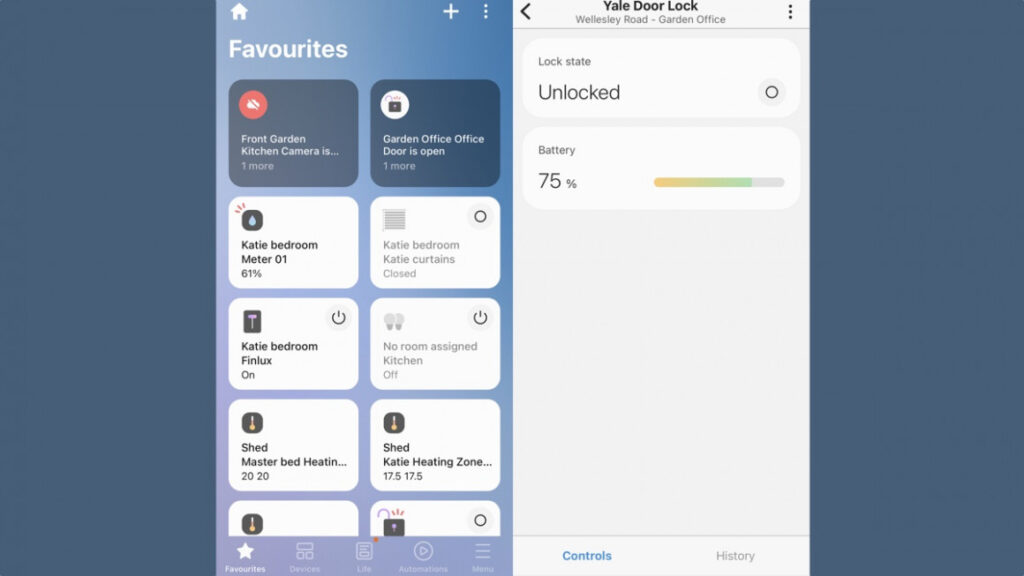
So, why bother with the hub? Well, Z-Wave and Zigbee devices are great for sensors and remote controls, as they can last for years on a set of batteries providing the basic ingredients for a smart home.
There are loads of SmartThings-compatible devices to choose from, with Aeotec making a tonne itself.
With sensors, you can make some very smart rules. For example, you can turn your Hue lights and Sonos player off in a room automatically if motion’s not detected for a set period. Or, a door sensor can trigger a light to turn on.
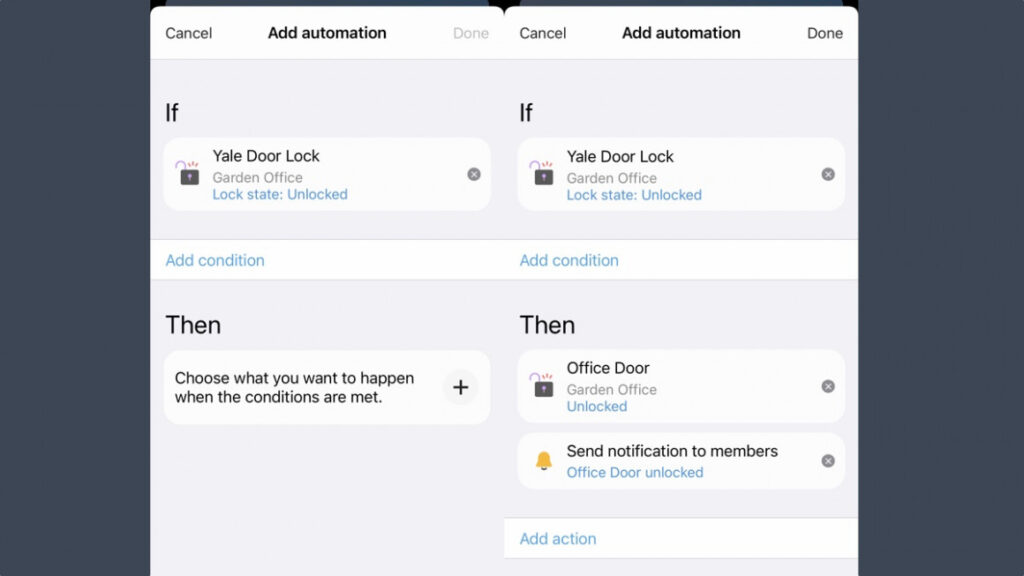
Upgrade to WebCORE and you can implement much more advanced routines, limiting them by the time of day and device status even. It’s not a tool for the beginner but it’s hard to think of another smart home platform that provides such smart automation.
There are two big downsides to SmartThings.
First, and this applies to every other smart platform, is that device support is not universal. If you want to achieve something, it’s likely that you’ll need to use one or more platforms (IFTTT, HomeKit via Homebridge and so on) to do what you want.
For example, I have SmartThings run through Homebridge so that I can automatically disable my Ring Alarm when my Yale Conexis L1 unlocks using HomeKit.
Although there is a third-party Ring integration for SmartThings it’s not easy to install, so I’m forced into using two platforms to do one thing.
Secondly, Samsung has made the Amazon Alexa Skill worse. With the old version of SmartThings, you can select which devices are available to Alexa; with the current version you can’t, so it’s easy to get duplicates.
Add Hue lights to SmartThings, for example, and they can appear in Alexa twice: once under the Hue Skill and once under the SmartThings Skill.
For more on what SmartThings can and can’t do, our excellent guide to Smart Things tells you far more about the system and what it’s capable of.
All that’s worth saying is that the Aeotec Smart Home Hub provides a reliable base for connecting Zigbee or Z-Wave devices.
Aeotec Smart Home Hub: Should you upgrade?
The more difficult question for owners of an existing SmartThings Hub is, should you upgrade? If you have a SmartThings Hub V1, the answer is a lot easier: yes, as the V1 hub no longer works.
If you have a SmartThings V2 or V3 hub, then these are currently both supported, so there’s little reason to upgrade: the Aeotec Smart Home Hub doesn’t bring new features or functionality.
That’s not to say that the V2 and V3 hubs won’t lose support in the future, but for now, you won’t gain anything by switching. I’d only recommend upgrading if you’re having problems with your existing hub.
For V1 hub users, the rub is that there’s no easy way to migrate from that to the Aeotec Smart Home Hub. Instead, you have to manually delete all of your existing devices and move them one by one to the new hub – our guide on migrating to the Aeotec Smart Home Hub tells you more.
For V2 and V3 users, there’s a least a tool that tries to do the job automatically, although at the time of writing I was waiting for Samsung support to give me access to it to see if it works. Clearly, the upgrade path isn’t as easy as it should be.
Aeotec Smart Home Hub: Should you buy it if you don’t have a hub?
Although SmartThings has lost a few features since it switched from the Classic app to the new one, and now has a worse Alexa Skill, it remains one of the best smart home automation platforms. As always, it’s a question of what you want to do as to whether the Aeotec Smart Home Hub is worth buying.
In many cases, the Hub isn’t needed at all, as much new hardware either runs through its own hub or connects via Wi-Fi, so you can add devices into your SmartThings account via the cloud.
There’s also the competition, as rival systems can use sensors from your existing smart home kit, so you don’t necessarily need to add Zigbee or Z-Wave devices directly.
Use Amazon Alexa Routines, for example, and you can trigger them with Hue motion sensors or your Ring Alarm sensors. Likewise, HomeKit can use Hue motion sensors, while Homebridge massively expands what you can do.
Ultimately, it’s down to hardware choice, and some devices work best running through the Aeotec Smart Home Hub.
If you want a wider range of sensors and controls, or have specific smart locks, then this hub is a great way to use them and SmartThings is a powerful platform.


